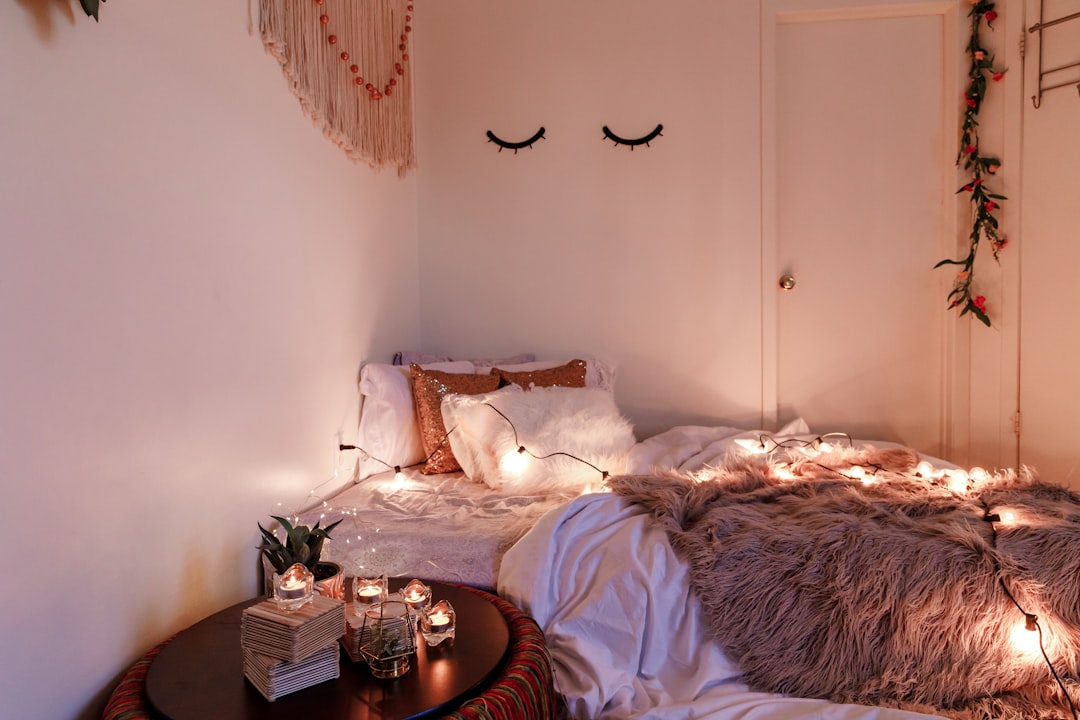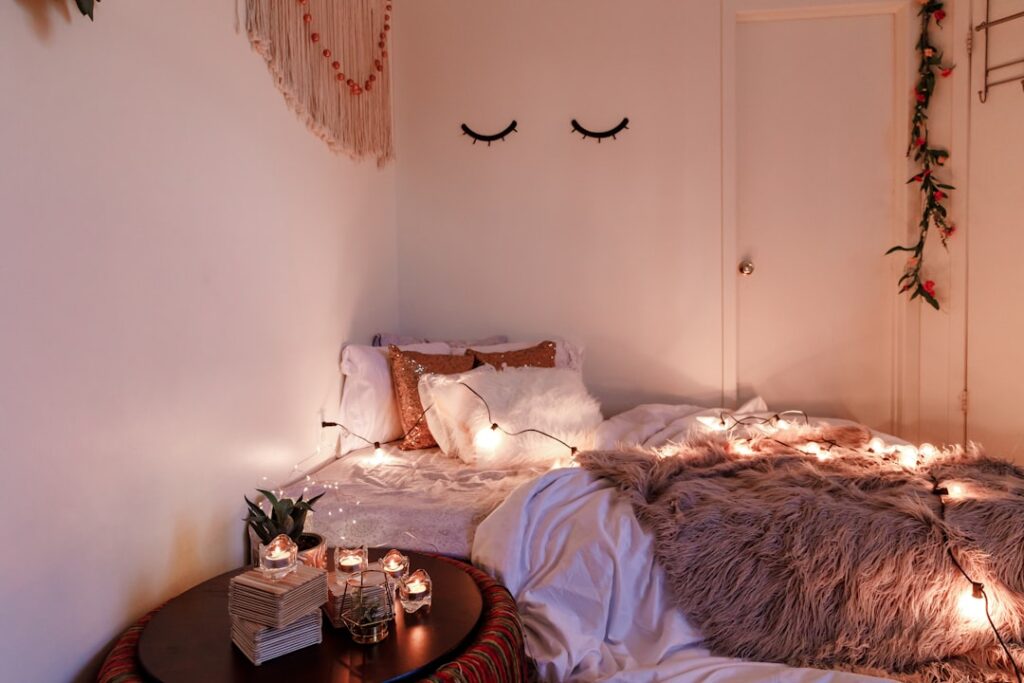


Hello, lovely readers! It’s Nicole. How many of you find yourself tossing and turning at night, your mind racing with the day’s to-do lists? I’ve been there too. Our bedrooms should be our ultimate retreat—a place to unwind and recharge. But sometimes, they become a dumping ground for laundry and clutter. Today, I want to share how you can transform your bedroom into a peaceful sanctuary that promotes amazing sleep and true relaxation. It’s easier than you think!

A calm mind starts with a calm space. Clutter can subconsciously cause stress and make it hard to relax. Before you do anything else, take some time to declutter.
Your nightstand sets the tone for your sleep space. Keep it simple and serene. Here’s what should stay:
Put away anything that doesn’t belong. This small act makes a huge difference.
We all have things we need in our bedroom. The key is to keep them out of sight. Use baskets under the bed or a pretty storage bench. This keeps the room looking tidy and peaceful.
Harsh overhead lights are the enemy of relaxation. The right lighting can completely change the vibe of your room.
Swap out bright white bulbs for warm white ones. They give off a soft, cozy glow that is much easier on the eyes. This small change makes your room instantly feel more inviting.
Instead of using one big light, use several small ones. A floor lamp in the corner, a small table lamp, and maybe even some string lights. This allows you to control how bright the room is and create a perfect ambiance for winding down.
Color has a powerful effect on our mood. While you might love a bright red accent wall, it’s not the best for sleep.
Soft, neutral colors are perfect for a bedroom. Think shades of white, beige, soft gray, pale blue, or gentle green. These colors are known to be calming and can help lower your heart rate and prepare you for sleep.
To keep a neutral palette from feeling cold, add different textures. A chunky knit throw, a soft velvet pillow, or a fluffy rug. These elements add depth and coziness to your space.
Your decor is important, but your habits are too. A good nighttime routine signals to your brain that it’s time to shut down.
Try to turn off all screens at least one hour before bed. The blue light from phones and TVs can mess with your sleep hormones. I know it’s hard, but it’s a game-changer!
Use that screen-free hour to do something relaxing. This could be:
Find what works for you and make it a habit.
A true sanctuary appeals to all five senses. We’ve covered sight and touch, but let’s not forget smell and sound.
A calming scent can work wonders. Use a diffuser with lavender or chamomile essential oil. Or simply light a scented candle (safely!) before bed to fill the room with a relaxing aroma.
If you live in a noisy area, consider a white noise machine or a simple fan. These devices create a steady, soothing sound that can mask disruptive noises and help you fall asleep faster.
Creating a bedroom sanctuary doesn’t require a big budget or a full renovation. It’s about being intentional with your space and your habits. Start with one small change tonight. Maybe it’s decluttering your nightstand or switching off your phone 30 minutes earlier. These little steps add up to create a big impact on your sleep and overall well-being.
Sweet dreams, everyone! I’d love to hear what you do to make your bedroom a peaceful haven. Share your tips in the comments below!
Soft, cool colors like pale blue, soft green, and lavender are often considered the best for bedrooms. They have a calming effect that can help reduce stress and prepare your mind for sleep.
Focus on small, impactful changes that are free or low-cost. Decluttering, changing your light bulbs to a warmer tone, and adding one cozy throw blanket can transform the feel of your room without spending much money.
Cozy is all about texture and soft lighting! Add plush pillows, a soft rug, and layered blankets. Use table lamps and dimmers instead of harsh overhead lights to create a warm and inviting glow.
Avoid bright blue light from screens, clutter, and work-related items. Your bed should also be for sleep only (not for working or eating), to strengthen the mental connection between your bed and rest.
Yes! Certain plants like snake plants and peace lilies can help purify the air. They also add a lovely, natural touch of life and serenity to your decor.
Extremely important! An old or uncomfortable mattress can significantly disrupt your sleep. If you wake up with aches and pains, it might be time to consider a new one that offers better support.
Absolutely. Visual clutter can subconsciously increase anxiety and make it difficult for your brain to relax. A tidy space promotes a calm mind, which is essential for falling asleep easily.
Soft, cool colors like pale blue, soft green, and lavender are often considered the best for bedrooms. They have a calming effect that can help reduce stress and prepare your mind for sleep.
Focus on small, impactful changes that are free or low-cost. Decluttering, changing your light bulbs to a warmer tone, and adding one cozy throw blanket can transform the feel of your room without spending much money.
Cozy is all about texture and soft lighting! Add plush pillows, a soft rug, and layered blankets. Use table lamps and dimmers instead of harsh overhead lights to create a warm and inviting glow.
Avoid bright blue light from screens, clutter, and work-related items. Your bed should also be for sleep only (not for working or eating), to strengthen the mental connection between your bed and rest.
Yes! Certain plants like snake plants and peace lilies can help purify the air. They also add a lovely, natural touch of life and serenity to your decor.
Extremely important! An old or uncomfortable mattress can significantly disrupt your sleep. If you wake up with aches and pains, it might be time to consider a new one that offers better support.
Absolutely. Visual clutter can subconsciously increase anxiety and make it difficult for your brain to relax. A tidy space promotes a calm mind, which is essential for falling asleep easily.